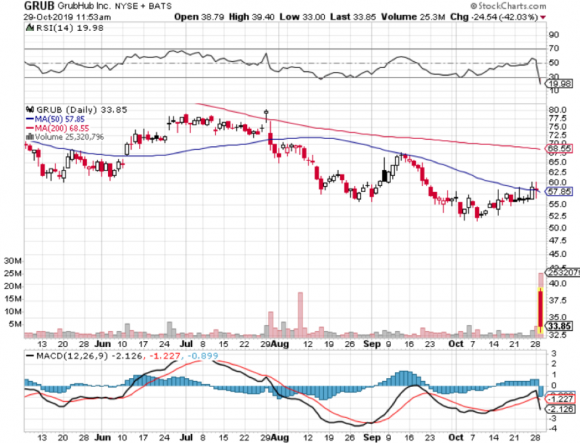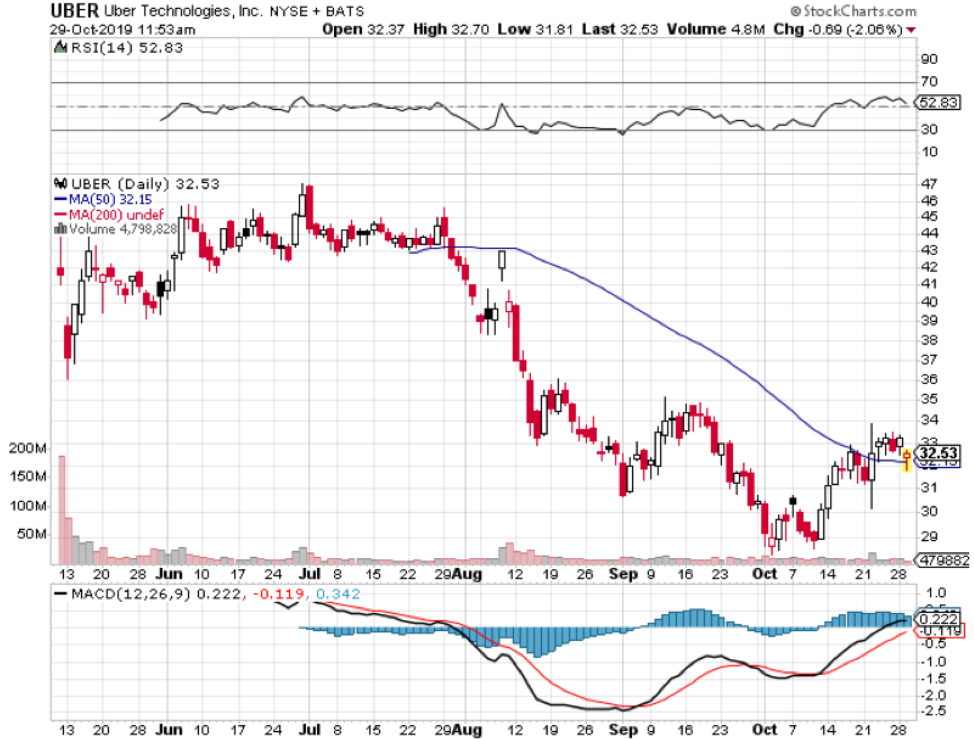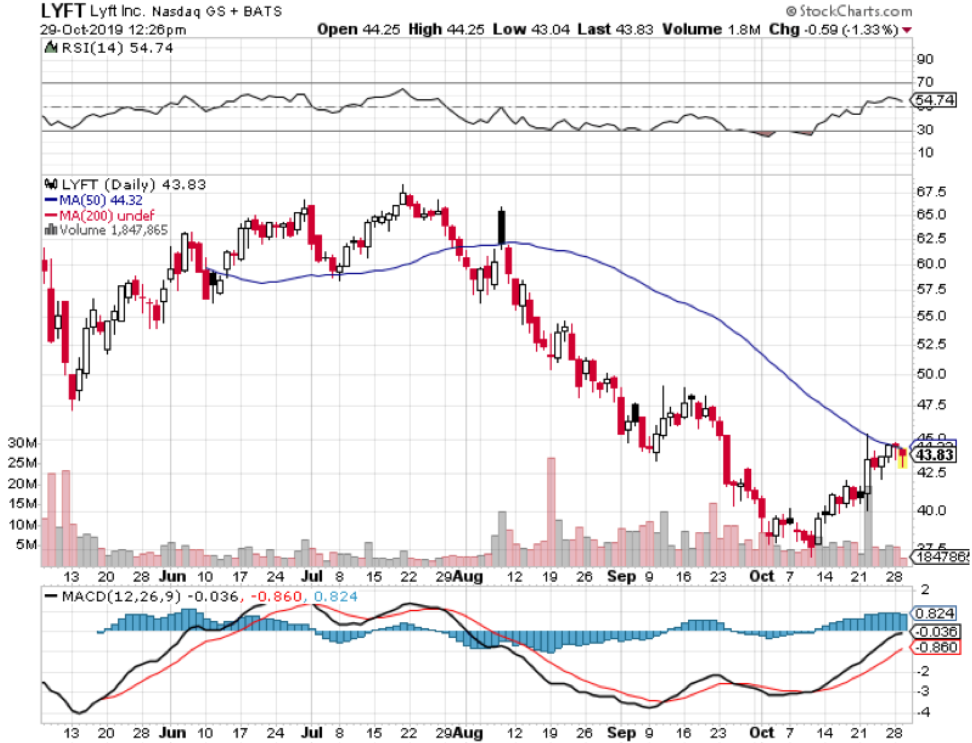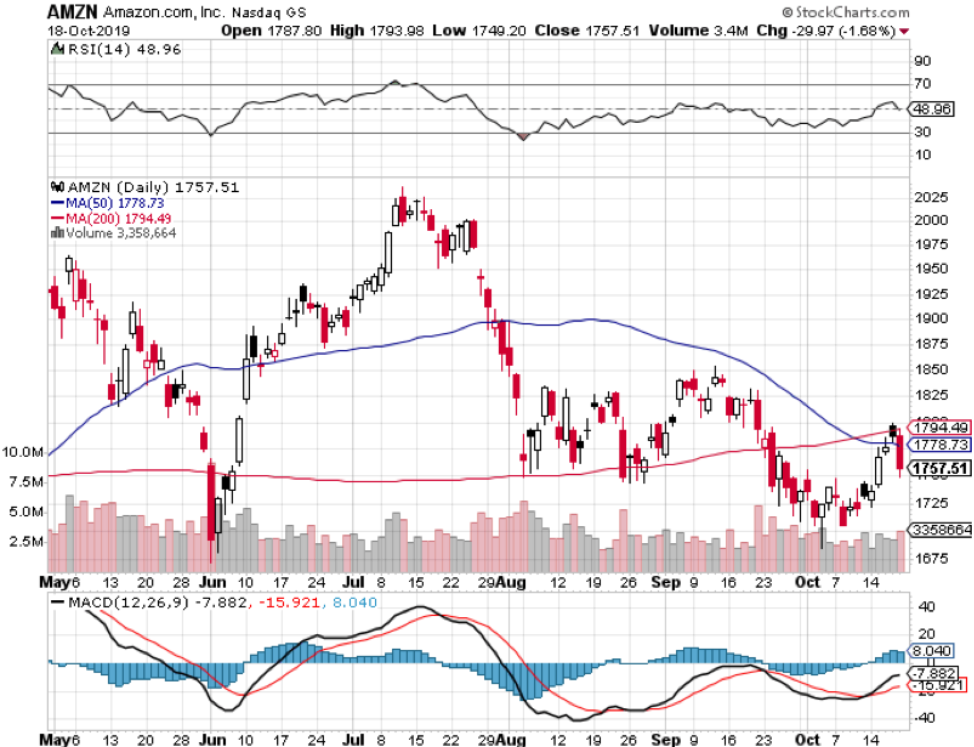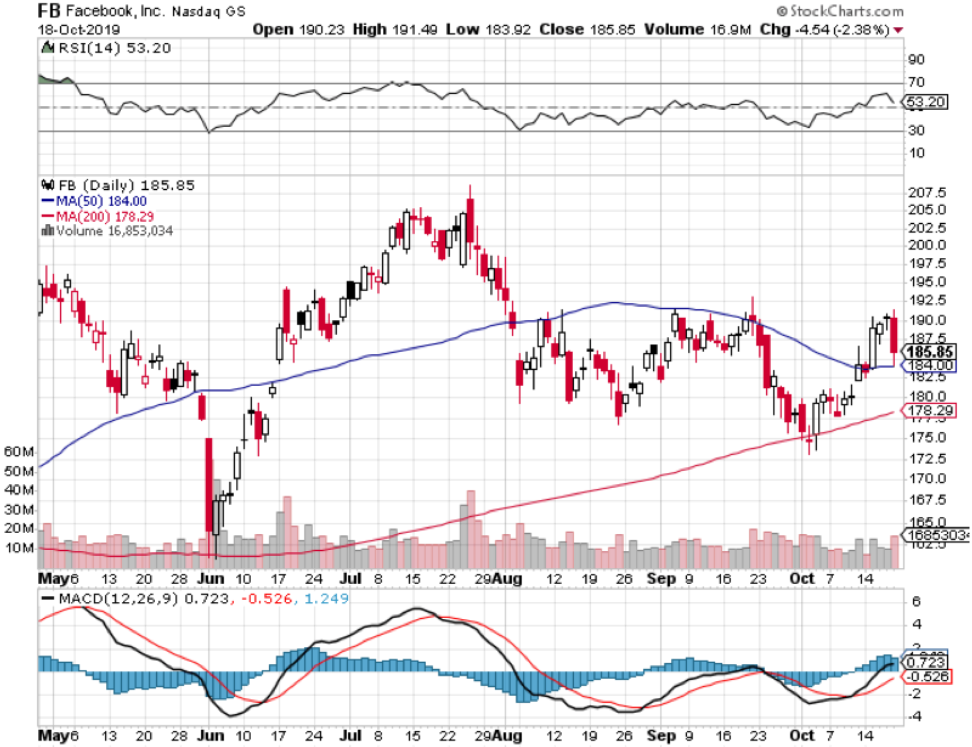“My goal was never to make Facebook cool. I am not a cool person.” – Said Co-Founder and CEO of Facebook Mark Zuckerberg
Mad Hedge Technology Letter
October 30, 2019
Fiat Lux
Featured Trade:
(GRUBHUB'S TOXIC MEAL),
(GRUB), (UBER), (LYFT)
It took me precisely 28 days and not a day more.
That’s how long it took for my bearish call on desperate online food delivery company, GrubHub (GRUB) to come to fruition.
I wrote an overly negative report on the company which was published on October 2nd explaining why this company and its terrible unit economics were set for a rude awakening.
I usually don’t revisit the same company within the same month in this newsletter, but when I looked at the price this morning, it took me a few minutes to wrap my head around the 44% daily decline.
I will go one more step now and profusely recommend that nobody in their right mind should currently take any bullish positions on any company reliant on employing the gig economy.
The gig economy has been found out for what it is – an elaborate scheme enriching tech stakeholders while shorting American blue-collar labor.
Instead of proper wages flowing to the Uber driver or in this case the GrubHub driver, management has maneuvered its way through some nifty alternative classifications enabling companies to divert a chunk of capital back into the business model.
If these companies can’t make money with skimping on driver pay, how will they make money when American law mandates them to cover sick leave, paid vacations, health insurance, and overtime pay which could soon be coming?
And on top of the subsidies which add to the overall unit cost, how on earth will they piece together a solution that would satisfy shareholders?
Then mix the unworkable unit economics and fuse it with a boatload of competition and my conclusion is clear - profitability is a pipedream.
Buttressing my claims of unprofitability and market stagnation in a note to shareholders, the company admitted, “supply innovations in online takeout have been played out.”
The pitiful food delivery company slashed fourth-quarter revenue projections to between $315 million and $335 million making a mockery of the $387.3 million consensus.
The house of cards is finally collapsing.
Who is the competition?
There are three fierce contestants in UberEats, DoorDash and PostMates.
And to add even more spice inside the fajita, PostMates has recently shelved a planned 2019 IPO because of “market conditions,” a testament to the poor growth prospects for online food deliveries.
I believe no food delivery stock will ever go public again unless they revalue themselves 65% lower from today’s prices.
Much of the value in these companies is a mirage.
To give GrubHub credit, they didn’t put up Chinese walls in their guidance and mentioned that competition is wreaking havoc detailing that their customers are not “extremely loyal.”
They should expect investors to not be extremely loyal either.
Existing customers are now price-shopping by surfing around different apps to take advantage of price promotions proving my point that these gig economy companies contribute minimal incremental value to the end user.
Their secret sauces are hardly secret.
These apps are commodities and yes, there is value in their proprietary algorithms, but by no means are the barriers of entry so colossal that it would take North Korean engineers 10 years to reverse-engineer these same algos.
And with wielding low-grade tech and resigned to “low double-digit” growth, the bullish case behind this stock and the industry as a whole becomes almost laughable.
Don’t bring a knife to a gunfight!
If Uber can perform miracles and reach $40 or if Lyft can snake its way up to $55, these would be the perfect entry points to scale into these cash burn disasters from the short side.
As for GrubHub, don’t buy the dead cat bounce.
“It would be nice to design a real briefcase - you open it up and it's your computer but it also stores your books.” – Said Co-Founder of Apple Steve Wozniak
Mad Hedge Technology Letter
October 28, 2019
Fiat Lux
Featured Trade:
(NEWSPAPERS REALLY KNOW WHO YOU ARE),
(TPCO), (AMZN), (FB), (GOOGL), (USPS), (SFTBY)
Publishing magnate and self-described populist William Randolph Hearst was a deep admirer of Adolph Hitler and did not shy away from using his newspapers as a de-facto mouthpiece spouting off der Fuhrer's propaganda.
Hearst created content sympathizing with the Nazi ethos and even mobilized an embedded secret agent from the German government to act as a correspondent that followed hot, daily scoops inside Germany.
Hearst also used his publishing clout to pull the strings in the 1932 presidential election backing candidate John Nance Garner or "Cactus Jack" who later agreed to be Franklin D. Roosevelt's running mate.
The fusion of politics and media has been chiseled into human DNA since antiquity. However, the purpose of newspapers has evolved significantly since it became impossible to break even about 10 years ago.
Print newspapers are a lot like the United States Postal Service (USPS) - it specializes in losing money.
However, the (USPS) was never politicized as was the publishing industry until the administration managed to commingle the loss-making mail outfit and Amazon as a joint problem roiling society.
The politicization comes at a cost to society.
All the well-intentioned journalists involved in earnest and quality journalism lose out because the new normal for newspapers has evolved into a William Hearst-like blatant tool promoting targeted interests.
Do you ever wonder why the Washington Post hardly ever publishes content harmful to the image and interests of Amazon?
Because it is owned by the same man, Jeff Bezos, who founded Amazon (AMZN) in 1994, as he cruised in his car cross-country from New York to Seattle where he would establish his tech empire.
Effectively, Jeff Bezos has the ear of each corner of the political power grid in Washington and even more so as he establishes another Amazon headquarter in the state capitol.
And while the administration attacked Bezos as a job destroyer repeatedly, Amazon has in fact been the largest private job CREATOR in the U.S. It added a staggering 130,000 new jobs in 2017, and an eye-popping 560,000 jobs over the past 10 years.
Laurene Powell Jobs, widow to Steve Jobs, acquire the Boston-based American magazine The Atlantic.
The Atlantic earns more than $10 million per year in revenue and lures in over 33 million readers per month.
Billionaire biotech investor Patrick Soon-Shiong reached a deal with Tribune Publishing Co. (TPCO), a portfolio of a vast array of various legacy media assets, to take over the Los Angeles Times and San Diego Union-Tribune for $500 million.
Tribune Publishing Co is a potential investment for SoftBanks' (SFTBY) Masayoshi Son, looking to scoop up parts of the extensive portfolio.
Private equity group Apollo and media firm Gannett Company are also in the mix to acquire Tribune Publishing Co
Some of Tribune Publishing Co.'s crown assets are the Chicago Tribune, the New York Daily News, and the Baltimore Sun among other regional newspapers with a large audience base.
The courting of these news media assets comes at a time when Google (GOOGL) is funding a project to automate more than 30,000 stories per month for the local media as a cost-effective way to advance the business model.
Quality journalism written by a human is the last thing in which these mega-tech companies are interested.
Tech is about automating and then scaling the automation. This bodes ill for personalized authors, and newspaper journalists are the lowest rung on the totem pole. They will be the first to be replaced by automation.
The first thought that came into my head when I heard about SoftBank's vision fund swooping in for another company was data grab.
We have seen this story time and time again.
Newspapers and how an online subscriber behaves on a digital newspaper platform offer valuable data points unfound elsewhere.
The data will reveal the political ideas, topics of interest, and other sensitive information deduced into a comprehensive data profile.
Effectively, a company such as SoftBank will be able to create a functional shadow profile for almost anyone.
The concept of shadow profiling emerged from the acrimony of Mark Zuckerberg's testimony in Washington and could be the next point of heated contention.
What are shadow profiles?
Shadow profiles are digital profiles crafted from data not directly handed over to Facebook (FB) by the user.
This data is extracted through fringe third parties, other friends on Facebook if they post content unique to you, and specifically through the "find your friends" function that recommends the uploading of an entire digital address book giving Facebook access to everyone you know.
Scarily, there is no opt-out for shadow profiling, and there probably won't be another congressional testimony about this topic anytime soon.
If Facebook wanted to turn into the FBI, it would be easy.
The treasure trove of data would give insight on the subtle nuances of authentic human behavior and how to best manipulate it.
This artificial profile would seem real.
If you are an Android user like most of the world, Google could fill out the most comprehensive profile with a high degree of accuracy on most people.
The scandalous bit about shadow profiling is that these profiles are whipped up even if a user has never signed up for Facebook.
Shadow profiling, along with other data, becomes more precise as the volume of data piles up. To understand the behavior, trends, and tastes of most of the world's population is incredibly valuable.
Facebook could use this shadow profiling data to understand the wide range of non-Facebook user behavior.
This way of monetizing data would be highly illegal if leaked to an actionable third party and would be significantly worse than the Cambridge Analytica scandal.
This data should be deleted immediately, but Facebook has a backdoor way to keep the data in the system.
If Facebook got slammed for data leakage then others are in danger, too. That's because Facebook is not the only player mining data for money.
It wouldn't be surprising if other large-cap tech companies started to create these shadow profiles to get dirt on their competitors as well as other use cases.
Tech is evolving at such a fast pace. It subconsciously encourages the never-give-up mentality that coerces firms to stay one step ahead which Amazon has been able to do since its inception.
Newspaper companies are next in line to be absorbed by large-cap techs continuously expanding web assets that hyper-focus on exponential data generation.
These newspapers will defend tech's interests in the economy similar to how newspapers were used as William Hearst's rallying cry for politics.
Jeff Bezos has chosen silence to react to the administration's vendetta against him but he could easily mobilize his assets to protect Amazon's interests.
Bezos just shrugs his shoulders and goes about his day because he knows Washington cannot do anything to prevent Amazon's dominance at the top of the tech food chain.
Better take the high road.
Not only do these big tech companies know who you talk to, what you buy, and where you are, but now they are given deeper access into the identity of users.
Be on the lookout for these assets to get cherry-picked and look forward to reading your future newspaper owned by Google, Facebook, and the usual cast of characters.
Stay away from legacy newspaper stocks. Only weigh up the media stocks that have already pivoted to the online streaming business model of scaling original premium content.
"The real danger is not that computers will begin to think like men, but that men will begin to think like computers," - said journalist Sydney Harris.
Mad Hedge Technology Letter
October 25, 2019
Fiat Lux
Featured Trade:
(THE DIGITAL NOMAD ISSUE)
People want a better life.
And the Internet has connected the outermost populations living in slum-like conditions giving them a feed into the biggest transformation ever to grace mankind.
The applications of the Internet are countless and promise to deliver huge productivity gains while lifting entire populations out of poverty.
The next leap of digital migration will see the remaining 3 billion of unconnected users connected offering new markets, fresh revenue streams and a super-charged level of competition that our tech behemoths have never seen before.
Each passing day not only sees the value of technology companies rise as data assets become more sought after but the level of expertise increases at a hyper-accelerated pace.
The human capital fueling the outperforming tech sector is like the blood that is pumped through the arteries.
Now, governments are getting in on the act, crafting policies that attempt to lure in top tech talent in an attempt to enhance their economies.
Digital nomads are frequently typecast as tech-savvy Millennials remotely working via an Internet connection while living as an expatriate.
However, they come in all shapes and sizes and that is the main point.
The Baltic nation of Estonia has been one of the leading lights in tech innovation, rolling out Skype before Facebook and Twitter existed.
Skype was entirely comprised of local Estonian developers who achieved this in the early 2000s.
Quite a feat for such a small nation.
This charming Baltic country has stepped up its game with a visa targeted at digital nomads and other countries will likely copy this progressive type of visa.
Estonia rolled out a revolutionary visa allowing digital nomads to work in Estonia all year round. This visa also includes 90 days of travel in the Schengen Area of mainland Europe.
This visa isn't targeted at EU citizens who already reap the benefits of working all over the European Union, but untapped tech talent that otherwise might not consider Estonia.
Estonia is on a mission to amass as many tech-savvy workers from far-flung places around the world, incorporating them into Estonian life, and boosting the level of innovation in a country that prides itself as a start-up hub.
More importantly, jacking up the volume of tech workers is becoming an existential issue for many sovereign countries as developed countries reap the monetary rewards from such new cutting-edge technology.
These digital nomads create communities that harness an enormous flow of tech know-how. Usually, their friends are fellow like-minded digital nomads that roll in packs with each other.
Tallinn, Estonia has rapidly turned into a top 10 digital stronghold attracting hordes of digital nomads.
If technical issues arise, help is usually just a shout across a coffee shop and presto!
Everything is fixed.
The message is that simple.
Estonia does not care where you are from, how many sugars you drink with your tea, or how you style your hair in the morning.
The concern there is if you know how to use a computer well or not. Plain and simple.
The global tech talent shortage is a pressing issue, and this is just the beginning.
Try hiring an experienced artificial intelligence engineer on the cheap, and headhunters will just hang up and delete your contact information. Better not to low-ball the offer.
In fact, something must give because visa policies are entirely based on legacy systems of yore.
The world has moved on and visa policies should reflect it.
Expect more exotic visa policies pinpointed exactly toward the type of immigrants that nations want as part of their national policy.
With the advent of low-cost carriers such as airBaltic, Spirit Airlines, and Norwegian Air, taking a flight halfway across the world is only a $200 proposition, thanks to wonders of deflation and ruthless competition.
And the further creation of private short-term rental app Airbnb has allowed digital nomads a pipeline of private housing to tap into whenever they jet-set across the globe.
The common denominator that denotes a perfect location for a digital nomad is cost.
Locations such as Copenhagen and Monaco are places of cultural beauty but pricey for a digital nomad to operate from as the wallet turns lighter consumed by the additional marginal cost of housing and hooking up a decent Internet connection.
Estonia and the rest of the Baltic countries are affordable and boast great digital infrastructure.
Sadly, Estonia is also grappling with aging demographics as with many of the Western powers and must lure 440,000 people just to maintain the current population of 1.3 million people.
Many of these Baltic countries lose huge swaths of youth that migrate to higher-wage countries in Western Europe.
Expectedly, they never come back unless just visiting relatives, in effect crushing the local birth rate.
The Estonian government has been bold and is, in some ways, acting with a start-up mentality itself.
This young, audacious government looks to scale up as fast as possible. The visionary policy is seen as the solution to maneuvering around long-lasting problems.
These pro-growth tech policies could invigorate local youth causing them to stay at home rather than flee to greener pastures.
This lifeline might slow down the 60% of local Estonians who dream of moving to a place where they can experience a higher quality of living standards.
Rebranding itself as the digital nomad epicenter is a risky move that most governments wouldn't dare to do.
It's easy to ignore the brain drain in the Baltics while I am living in the Bay Area.
Silicon Valley has been drawing in the cream of the crop for years.
Developers want to stay in California because of the high standard of living, which is even nicer on a developer's salary.
No doubt the Bay Area has poached its share of Baltic working professionals especially when Microsoft acquired Skype.
However, this Estonian policy starts with the low-hanging fruit as the biggest names in the industry’s power players will gravitate toward the oodles of venture capital and large pool of talent. Unfortunately, that place is not the Baltics.
You must learn how to crawl before you can walk. If this visa experiment takes off, it could be a game-changer while nudging the Baltics closer into the West's orbit of influence and raising income levels.
A win-win situation.
As for me, I won't be taking a $200 flight to Estonia to work in a coffee shop.
I prefer Incline Village, Nevada, and Zermatt, Switzerland, as my favorite digital nomad hideouts.
If it's not broke, don't fix it.
On My Way to Switzerland
Chiang Mai, Thailand - Another Digital Nomad Stronghold
“A brand for a company is like a reputation for a person. You earn reputation by trying to do hard things well.” – Said CEO and Founder of Amazon Jeff Bezos
Legal Disclaimer
There is a very high degree of risk involved in trading. Past results are not indicative of future returns. MadHedgeFundTrader.com and all individuals affiliated with this site assume no responsibilities for your trading and investment results. The indicators, strategies, columns, articles and all other features are for educational purposes only and should not be construed as investment advice. Information for futures trading observations are obtained from sources believed to be reliable, but we do not warrant its completeness or accuracy, or warrant any results from the use of the information. Your use of the trading observations is entirely at your own risk and it is your sole responsibility to evaluate the accuracy, completeness and usefulness of the information. You must assess the risk of any trade with your broker and make your own independent decisions regarding any securities mentioned herein. Affiliates of MadHedgeFundTrader.com may have a position or effect transactions in the securities described herein (or options thereon) and/or otherwise employ trading strategies that may be consistent or inconsistent with the provided strategies.



